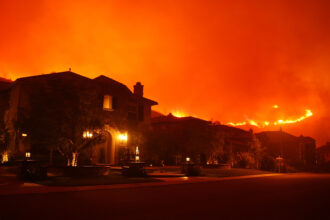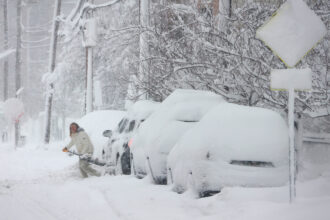A plan in New Jersey meant to prevent sewage spills is pitting two of the state’s goals—protecting the environment and protecting vulnerable communities—against one another. It’s a reminder of how easy it can be to lose sight of environmental justice in the pursuit of tackling other green issues, like climate change.
The Passaic Valley Sewerage Commission, a 120-year-old state body that focuses on pollution concerns of the Passaic River and its tributaries, was set on Thursday to approve a $180 million backup power plant that would kick in when a sewage treatment system gets knocked offline, helping to prevent backed up waste from spilling into the state’s waterways. Such a spill happened in 2012 after Superstorm Sandy slammed the region with heavy rain and winds, causing nearly a billion gallons of raw sewage to leak out.
But the plant would be built in the Ironbound neighborhood of Newark, a predominantly Black and Brown community in the most populated city in the state. For years, Ironbound residents and environmental justice groups have been fighting projects like this one, complaining that their community is already overburdened by pollution. The Ironbound neighborhood sits within five miles of the state’s airport, the shipping port, two power plants, three major interstate highways and a plethora of industry.
“Your administration will repeat the historic pattern of placing unfair environmental burdens on communities of color,” a coalition of environmentalists, doctors and local activists wrote in a letter to Gov. Phil Murphy last month, referring to the plans to build the new natural gas-fired power plant.
The group’s concerns are ones shared by many communities and environmental justice groups across the nation, as public opinion pushes lawmakers to take environmental issues like climate change more seriously. Another project in Florida, for example, had a mostly African American community up in arms after the state legislature preempted local governments from blocking solar farms on land that was mainly used for agricultural purposes.
In fact, President Biden made addressing issues of environmental injustice—the idea that communities of color and low-income families often suffer the most pollution and benefit the least from environmental protection laws—a priority of his environmental agenda when he first took office. His administration, however, is struggling to bring that vision into reality.
On Thursday, Gov. Murphy stepped in and delayed the commission’s vote on the Ironbound power plant proposal, handing at least a temporary victory to activists. Murphy is now calling for officials to more thoroughly review the environmental impact of the project.
“I think we cut it very close, but I’m so thankful that the governor came through and delivered on his environmental justice promises,” Maria Lopez Nuñez, a lead organizer at the environmental advocacy group Ironbound Community Corporation, told the Gothamist. “There’s more fight left. Now, we need to make sure that after a meaningful public process that we end up with a solution that’s doable.”
On a rare note of more light-hearted climate news, I’d like to wrap this week by pointing to this E&E story. It details how the New York Times issued a correction on Wednesday for a crossword puzzle clue after readers blasted the publication online, saying it was spreading misinformation. The clue: “greener energy source.” The answer: “clean coal.”
That’s it for Today’s Climate, and I’ll be back in your inboxes on Tuesday.
Today’s Indicator
315,000 gallons
That’s how much diesel has been recovered so far after a severely corroded pipeline just outside of New Orleans ruptured this week, killing thousands of fish, birds and other animals, u003ca href=u0022https://apnews.com/article/business-environment-and-nature-new-orleans-environment-0d62cab0f0b131e48b77b97017766c3fu0022u003eofficials saidu003c/au003e.
Top News from Our Warming World
About This Story
Perhaps you noticed: This story, like all the news we publish, is free to read. That’s because Inside Climate News is a 501c3 nonprofit organization. We do not charge a subscription fee, lock our news behind a paywall, or clutter our website with ads. We make our news on climate and the environment freely available to you and anyone who wants it.
That’s not all. We also share our news for free with scores of other media organizations around the country. Many of them can’t afford to do environmental journalism of their own. We’ve built bureaus from coast to coast to report local stories, collaborate with local newsrooms and co-publish articles so that this vital work is shared as widely as possible.
Two of us launched ICN in 2007. Six years later we earned a Pulitzer Prize for National Reporting, and now we run the oldest and largest dedicated climate newsroom in the nation. We tell the story in all its complexity. We hold polluters accountable. We expose environmental injustice. We debunk misinformation. We scrutinize solutions and inspire action.
Donations from readers like you fund every aspect of what we do. If you don’t already, will you support our ongoing work, our reporting on the biggest crisis facing our planet, and help us reach even more readers in more places?
Please take a moment to make a tax-deductible donation. Every one of them makes a difference.
Thank you,












